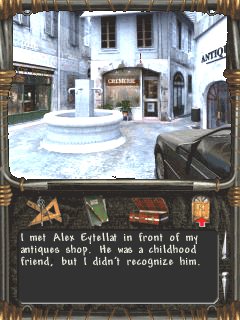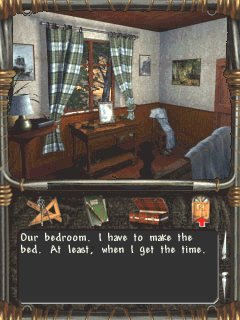|
Fade
 To help pass the lengthy flying time on a recent overseas holiday I loaded a few games on a pocket PC. Some of these were older games which I have for the PC but had never got around to playing, but Fade is an adventure game I stumbled across developed entirely for the pocket PC. It had won an award, and that, plus one look at the screenshots, was enough to convince me to purchase the game.
It really does look good, particularly given its size. More importantly, given the large amount of detail in each scene, nothing is indistinct and at no stage did I think it cluttered or crowded. The images are crisp and sharp, finely detailed, and full of places and things to poke around in and uncover. It's small but rich, and a graphic tribute to its makers. To help pass the lengthy flying time on a recent overseas holiday I loaded a few games on a pocket PC. Some of these were older games which I have for the PC but had never got around to playing, but Fade is an adventure game I stumbled across developed entirely for the pocket PC. It had won an award, and that, plus one look at the screenshots, was enough to convince me to purchase the game.
It really does look good, particularly given its size. More importantly, given the large amount of detail in each scene, nothing is indistinct and at no stage did I think it cluttered or crowded. The images are crisp and sharp, finely detailed, and full of places and things to poke around in and uncover. It's small but rich, and a graphic tribute to its makers.
You play in the first person as Louis, a person who clearly has trouble remembering what is or was what, a condition not at all helped by disturbing blackouts and even more disturbing results. Financial problems make the offer of a job, albeit a mysterious job, all the more attractive - at least at first. You begin to uncover what is going on in Louis' world as you move through the game, and it's not at all a straightforward place, whatever its outward appearance.
The plot was a bit of a mixed blessing. I thought it started strongly, and whilst it was at times a little disjointed, it progressed quite well. However it became a bit too convoluted for its own good, and had to resort to a fairly large summation at one point to presumably ensure everyone was on the same page. The real disappointment, though, was the resolution; far too rushed and wordy to be satisfying, and I thought it was overly contrived. It was not a good note on which to indicate that it was "to be continued".
It was, though, elaborately told, and did not forsake depth and description. In that regard, the text sits well with the detail in the graphics, and the two compliment each other. I liked that aspect a lot.
Game play is simplicity itself. Fade is played exclusively with the stylus, and you simply tap your way along. The game world occupies just over half the screen, and tapping on objects or people in the game world will reveal whether and what interaction might be possible. With a person, it is most commonly a conversation. With an object, you may get no response at all, or you might generate a little menu saying, for example, 'look' or 'examine' or 'search', or indeed more than one option. Tapping the one you want might generate a response, or a close up of whatever it is you chose to search, or nothing at all. It's not unlike many older style adventure games which had command icons for various activities.
 Some of the interesting textual detail is, in fact, revealed through these little pop up menus. You might find you can 'reminisce' about a photo, 'muse' about the wallpaper, or 'appraise' a painting (Louis sells antiques so has a keen eye for value). Some options are important and essential to the progression of the game, but much simply fleshes out the bones. I tended to avail myself of all the options, for no other reason than doing so was on the whole enjoyable.
Some wry humour might also be offered through your possible responses, generally well integrated into the situation. For instance you might be offered the option to 'strangle' an annoying conversationalist (Louis always resists the temptation).
Four icons below the game world give access to the menu screen, a diary which records significant events (and which will flash to indicate a new entry), your inventory, and the other locations available from wherever you might be. Within the inventory you can examine or combine items, or select items to use in the game world.
Most of the puzzle solving in the game will involve inventory items. Fade is like many inventory quest games - the challenge is to find and use the right items in the right spot to progress the game. It is not a difficult game, clues and obvious uses being prevalent. Further, on many occasions your activities are limited to only a few screens, so your possible options are limited. As such, the larger locations (like the asylum) offer a bit more of a challenge. As always, there was the odd obscure use of an item whose logic simply escaped me. Some of the interesting textual detail is, in fact, revealed through these little pop up menus. You might find you can 'reminisce' about a photo, 'muse' about the wallpaper, or 'appraise' a painting (Louis sells antiques so has a keen eye for value). Some options are important and essential to the progression of the game, but much simply fleshes out the bones. I tended to avail myself of all the options, for no other reason than doing so was on the whole enjoyable.
Some wry humour might also be offered through your possible responses, generally well integrated into the situation. For instance you might be offered the option to 'strangle' an annoying conversationalist (Louis always resists the temptation).
Four icons below the game world give access to the menu screen, a diary which records significant events (and which will flash to indicate a new entry), your inventory, and the other locations available from wherever you might be. Within the inventory you can examine or combine items, or select items to use in the game world.
Most of the puzzle solving in the game will involve inventory items. Fade is like many inventory quest games - the challenge is to find and use the right items in the right spot to progress the game. It is not a difficult game, clues and obvious uses being prevalent. Further, on many occasions your activities are limited to only a few screens, so your possible options are limited. As such, the larger locations (like the asylum) offer a bit more of a challenge. As always, there was the odd obscure use of an item whose logic simply escaped me.
Difficulty is increased somewhat by the fact that there are no hotspots in the traditional sense; only by tapping will you see if a place or thing can be further utilised, which makes meticulous examination of each screen essential. Were the graphics not of such high quality, this might cause problems, as some items are quite small. At no time, however, did I fail to see something I needed.
Some conversations are essential to progressing the plot, and the remainder of the screen is where text and dialogue trees are displayed. There is no spoken word so everything must be read, but I did not find this a chore at all. You control the pace of the text, and whilst you can't automatically go back, the diary function and the capacity to often have the same conversation again means you need not worry about missing anything (other than through your own failure to recognise a key point).
Whilst dialogue trees are present, choosing a wrong option in a conversation will simply keep the conversation going until you have selected the right one. The art of conversation is therefore somewhat basic.
There is a very small amount of adult language and content.
All the screens are static, and sound effects are sparse but well used. There is no musical score, so it is a rather silent game. The graphics and text, though, ensure it is not a sterile experience.
To the contrary, it's quite an atmospheric game, which is all the more remarkable given the size of the gameworld. Given the use of the written word, it's a lot like a good book in that respect, only with sound effects to heighten the mood. It has sinister and disturbing overtones which can become quite pronounced, and at times I was completely engrossed.
There are 3 save game slots which was 2 more than I needed. Louis can't die, nor can he be dead-ended. There are no sliders mazes or music puzzles, which is probably a plus for most Quandary readers. It was also a reasonable length, giving me 20 hours or so of play, spread across more than 450 separate screens.
All in all I thought Fade was a solid game, whatever the platform. It is the best graphic adventure I have played on a pocket PC by a mile, and it stands up quite well alongside many PC games of this type. Were it not for the plot deficiencies referred to, it would compare even more favourably. It is not a reason to buy a pocket PC, but if you have one and you like inventory based games, then there is a lot to like in Fade.
Copyright © Steve Ramsey 2004.
All rights reserved.
System Requirements:
Pocket PC Mips, SH3, ARM/XSCALE or PPC2002 system, 11.5 MB storage memory, 10.5 MB program memory
|
